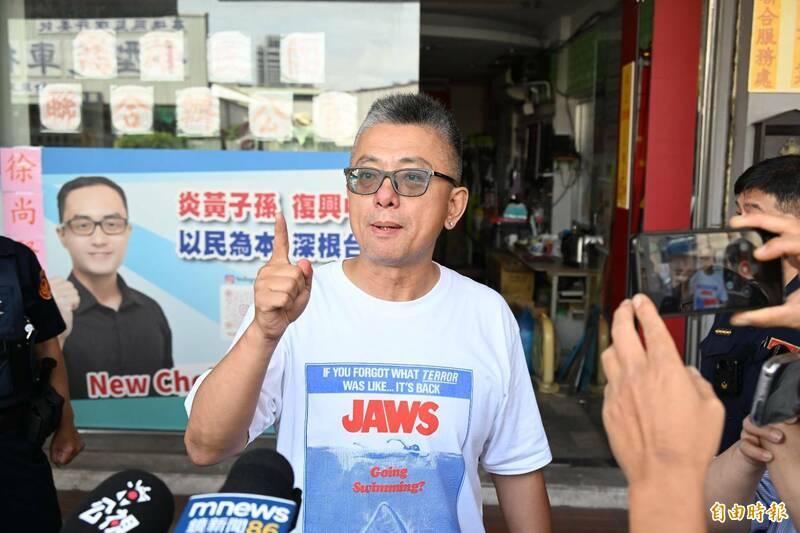The Kaohsiung District Prosecutors’ Office took away one of the main organizers of a Kaohsiung legislatorial recall campaign for questioning after carrying out a search on the recall campaign's headquarters and the residences of its organizers today.
The recall campaign targets Democratic Progressive Party (DPP) Legislators Hsu Chih-chieh (許智傑) and Huang Jie (黃捷), referring to itself as a “double strike” campaign against the DPP.

Photo: Lee Hui-chou, Taipei Times
Police questioned and took away Chu Lei (朱磊), who is leading the campaign against Hsu Chih-chieh, and confiscated several computers.
The residences of Chu and another campaign leader, surnamed Huang (黃), were also searched.
Speaking to assembled media, Chu said that he “was not surprised” by the investigators and that this investigation “demonstrates the importance” of the recall campaign.
Chu compared the search to authoritarianism, saying that in the past he would have had to answer to Taiwan Garrison Command, whereas now it is to the Investigation Bureau and in the future it would be martial law courts.
Chu said details about the case were not entirely clear to him and that he would not comment further, although he said the search was not related to the second stage of his recall campaign and called on people to continue supporting their efforts.
The Kaohsiung District Prosecutors’ Office declined to comment.
Hsu Shang-hsien (徐尚賢), the “double strike” campaign leader, called today’s search an example of “blatant political interference.”
The Kaohsiung Chinese Nationalist Party (KMT) chapter said it was not involved with the campaign, although it called for a fair judicial process and asked for investigators to act impartially.
Legislative Speaker and former Kaohsiung mayor Han Kuo-yu (韓國瑜), a member of the KMT, said in a Facebook post today that the public expects the judiciary to uphold democracy and rule of law, calling on prosecutors and police to defend their independence.
Han expressed his hopes that the judicial process would never serve any political party and that those involved would uphold Taiwan’s hard-won freedoms.
Additional reporting by Ko Yu-hao

The Coast Guard Administration (CGA) yesterday said it had deployed patrol vessels to expel a China Coast Guard ship and a Chinese fishing boat near Pratas Island (Dongsha Island, 東沙群島) in the South China Sea. The China Coast Guard vessel was 28 nautical miles (52km) northeast of Pratas at 6:15am on Thursday, approaching the island’s restricted waters, which extend 24 nautical miles from its shoreline, the CGA’s Dongsha-Nansha Branch said in a statement. The Tainan, a 2,000-tonne cutter, was deployed by the CGA to shadow the Chinese ship, which left the area at 2:39pm on Friday, the statement said. At 6:31pm on Friday,

The Chinese People’s Liberation Army Navy’s (PLAN) third aircraft carrier, the Fujian, would pose a steep challenge to Taiwan’s ability to defend itself against a full-scale invasion, a defense expert said yesterday. Institute of National Defense and Security Research analyst Chieh Chung (揭仲) made the comment hours after the PLAN confirmed the carrier recently passed through the Taiwan Strait to conduct “scientific research tests and training missions” in the South China Sea. China has two carriers in operation — the Liaoning and the Shandong — with the Fujian undergoing sea trials. Although the PLAN needs time to train the Fujian’s air wing and

The American Institute in Taiwan (AIT) put Taiwan in danger, Ma Ying-jeou Foundation director Hsiao Hsu-tsen (蕭旭岑) said yesterday, hours after the de facto US embassy said that Beijing had misinterpreted World War II-era documents to isolate Taiwan. The AIT’s comments harmed the Republic of China’s (ROC) national interests and contradicted a part of the “six assurances” stipulating that the US would not change its official position on Taiwan’s sovereignty, Hsiao said. The “six assurances,” which were given by then-US president Ronald Reagan to Taiwan in 1982, say that Washington would not set a date for ending arm sales to Taiwan, consult

A Taiwanese academic yesterday said that Chinese Ambassador to Denmark Wang Xuefeng (王雪峰) disrespected Denmark and Japan when he earlier this year allegedly asked Japan’s embassy to make Taiwan’s representatives leave an event in Copenhagen. The Danish-language Berlingske on Sunday reported the incident in an article with the headline “The emperor’s birthday ended in drama in Copenhagen: More conflict may be on the way between Denmark and China.” It said that on Feb. 26, the Japanese embassy in Denmark held an event for Japanese Emperor Naruhito’s birthday, with about 200 guests in attendance, including representatives from Taiwan. After addressing the Japanese hosts, Wang